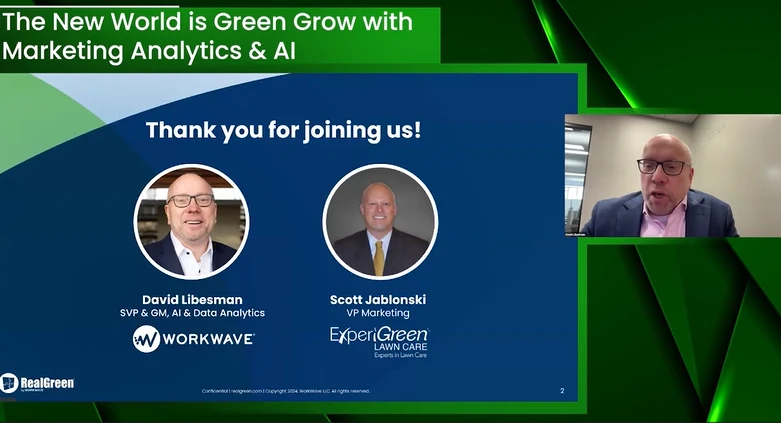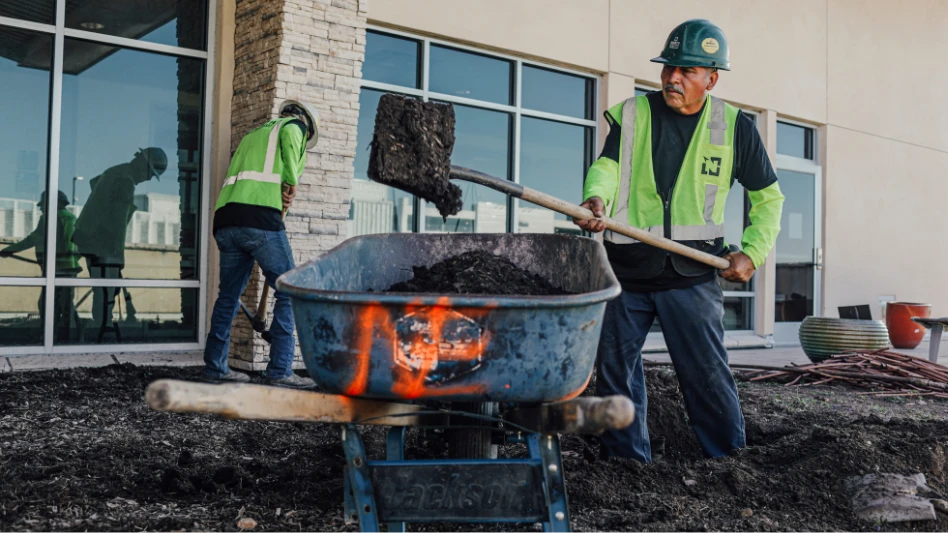
Growing a company organically, without private equity investment, is not without its challenges.
Still, there are plenty of success stories within the industry of companies that have grown from small, one-man operations to multi-million-dollar businesses.
A few of these business owners sat down on the “Organic Route” panel at the first-ever Lawn & Landscape Business Builders Summit in May.
Marcus Celiano, president of Golden Wolf Landscape Design, started his company in 2018 and hit the million-dollar mark in his first year in business.
“The financial impact that it takes to grow a business is very important,” Celiano says. “When starting a business, there’s a very fine line in being profitable and growth.
“We were boot-strapping everything,” he adds. “There’s obviously been some sleepless nights.”
Mike DiFabbio, co-owner of Encore Landscape Management, credits industry relationships for helping his company hit the ground running.
“The reason for our aggressive growth was a huge head start,” DiFabbio says. “We had relationships with clients already and the labor.”
Despite what it took to get to the top, there will be tough times for business leaders trying to take their company to the next level.
That’s why Nate Farley, founder and CEO of NationScapes, sought out insight from others.
“It’s a really lonely place,” Farley says. “We put together an advisory board for our company. We meet three times a year. They point out your blind spots and where you’re weak.”
Farley notes that it may be hard to get the highly influential people you want on your advisory board to commit, so that’s why you have to make it worth their while.
“Generally, the people you want on your advisory board are too busy to be on your advisory board,” Farley says. “I would not have an advisory board if there wasn’t a way to compensate them. They get ‘X’ percent of the growth based on three years.”
Steven Bromell, co-founder of Pro Cutters Lawnscapes, also utilizes an advisory board as a way to fuel growth. Bromell, who is also leads his local Georgia market’s chamber of commerce, sits on an advisory board made up of executives from different industries, where he receives advice on investing, strategies and more.
“It’s an all-day event once a month,” Bromell says. “The walls are taken down and you can be honest about where you are with the business.”
Despite all he’s learning and Pro Cutter’s continued growth, Bromell says his main challenge remains the same year after year.
“One of our challenges early on was people,” Bromell says. “People are always the challenge, but they are also always the solution.”
That’s why Bromell and Pro Cutter are building a training facility and writing a proprietary curriculum for it. They want new employees to go through thorough on the job training before stepping foot on customers’ lawns.
This approach to prioritizing training and employee growth is just one way Pro Cutters gets the most out of their staff.
“Every opportunity you get to celebrate your people is a win,” Bromell adds.
Farley notes another way to motivate employees is through recognizing what’s important to them.
“Your employees like when you understand what they care about,” Farley says. “They want culture and they want you to care. The workforce is turning over. Money is not the motivator for the next generation. We try to find what makes each person tick.”
But for those who are still fuel by making more money, Farley says performance-based compensation can be a great way to grow the company.
“If they want to earn more — the world is their oysters — go produce more,” Farley says.
DiFabbio says Encore Landscape Management is also prioritizing training and career development to take the company to the next level. They have implemented a training and development department to install clear career paths for all employees.
“Our philosophy is being as proactive as we can in setting those career pathways,” he says. “It’s for all the way from crew members on up.”
Celiano says at Golden Wolf identifying career advancement opportunities for office staff was more difficult than for front-line workers — until he put it in each employee’s hands.
“It’s relatively simple for crew members and crew leaders but in the office little bit of a challenge — I asked everyone to create their own to see what pathway they envision,” Celiano explains. “It was eye-opening to them.”
As these four companies continue to grow through the hard work of not only their leaders but also their employees, the sky seems to be the limit — but would they ever consider selling their companies?
“I got into this industry to enrich and empower people’s lives… if an opportunity came around to improve the lives of those people, we’d absolutely take it,” Farley says. “They understand we’ll make a decision that’s in everyone’s best interest, and they trust in that.”
Bromell equates his business to being almost another child of his.
“It’s hard to say if I will or won’t,” he says. “It’s like a baby — and do you really want to give it up?
“Right now, I’m having fun and I’m reinvigorated about the future,” Bromell adds.
For DiFabbio and Celiano, they are eager to see where they can take things on their own.
“I’ll always consider anything,” DiFabbio says. “But I still feel like our company is in its infancy and I think we owe it to ourselves to see where we can grow it to organically.
“We have a 10-year goal to be in 30 locations by 2035,” he adds. “We’re all in.”
Celiano says the time to sell may come eventually, but he doesn’t anticipate it coming any time soon.
“At some point it could make sense,” Celiano says. “I think everyone wants to push their limits and their boundaries to see what they’re capable of. I’d be open to it at some point.”
Get curated news on YOUR industry.
Enter your email to receive our newsletters.Latest from Lawn & Landscape
- Ever-changing landscape of SEO
- Fleetio acquires Auto Integrate, raises $450M in Series D funding
- Davey Tree expands in St. Paul, promotes Ostlie to district manager
- Schill Grounds Management taps 3 for senior leadership roles
- HD Hyundai Construction Equipment North America adds to wheeled excavator lineup
- High maintenance
- From Design to Proposal: Estimating and Rendering Support Services
- PERC adds Joel Stutheit as senior manager of business development






